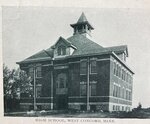
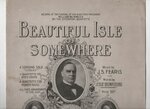
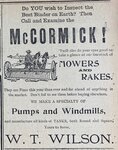
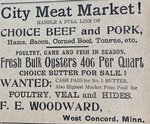
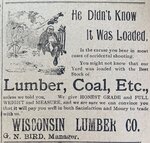
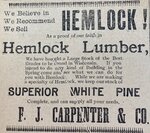
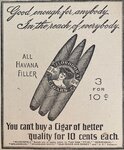
I spend a great deal of time in a building constructed in 1902. Our Museum is the oldest public building in West Concord whose interior still shows how structures were built at the turn of the century. Our school is 122 years old and we can definitely say it was built to last. I love the oak woodwork, the hardwood floors, the transom windows and the tin ceilings. I miss the large windows that were originally in place—whose outline you can see when you look from the outside. They were replaced in the 1980’s with smaller, energy-efficient windows and the extra space infilled. A dream is to one day have the original large windows back. Those windows were so important because the original school did not have electricity or plumbing until the south addition in 1914. The windows provided the main light source for the school for twelve years.
So what was happening in America in 1902? U.S. citizens were recovering from the tragic assassination of President McKinley in the fall of 1901. Teddy Roosevelt, McKinley’s vice-president, succeeded him and Teddy Bears were invented. Enrico Caruso made the first gramophone record that sold a million copies. The very first movie theater opened in Los Angeles. The Isthmian Canal Act authorized the building of the Panama Canal and Cuba gained independence from Spain. Theodore Roosevelt became the first president to ride in an automobile.
In West Concord, times were “booming”. The 17 year old town was experiencing much building and opening of new enterprises. Imagine, two lumber yards were thriving, the Wisconsin Lumber Co. and Carpenter’s. From horse blankets to women’s hats, you could buy everything you needed in West Concord.
There was some controversy about the school in the spring of 1902. Some folks in town thought the new school should be built right where the old one was—approximately where our former car wash is today. Other people were adamant that a new site in the middle of town would be best. After more than one vote to settle the controversy, the new site was settled on, purchased, and construction begun. The new school was to have a capacity of 250 with a high school room upstairs that could accommodate 75 students. When the school did open in the fall of 1902, the teachers had a complaint that was registered in the Enterprise. Parties for children under the age of 13 had been abundant on school nights—sometimes three a week.
The teachers asked if partying could be restricted to Friday and Saturday nights so that social life wouldn’t interfere with the school work of the children. As a former teacher, I understand all too well. On William McKinley’s birthday the new school focused on lessons about his life out of respect for the martyred president. The WRC (Women’s Relief Corps) hosted a program and supper fundraiser in honor of McKinley’s birthday, too. The country was still struggling with his loss.
Phones were gradually being installed in various businesses. They were big news and were duly reported in the newspaper. The Concord House Hotel had one put in and E.A. Parkins had a “hello” placed in his residence. When bananas were being unpacked in a grocery store in town, it was discovered a tarantula had come with them. The spider soon found a home in a glass jar at the store.
All kinds of entertainment were passing through West Concord with performances at the Opera House. Even the Euterpean Quartette, who had recently performed “Beautiful Isle of Somewhere” at President McKinley’s funeral and were an especially top-flight group, performed in West Concord’s concert series in 1902.
Vehicle accidents were common, but they weren’t motorized vehicles yet. When D.D. Avery was driving to West Concord from Concord in the snow to attend lodge, he tried to “turn out to let a team of horses pass, and ran into a pile of stone that someone had kindly put on the roadway.” The cutter tipped over and dumped Mr. Avery in the snow, but he escaped without injury. Carrie Dingler, her brother, and a friend were driving home in their buggy in “quite a storm” after a Rebekah Lodge meeting. After they crossed the bridge their horse “stepped off the embankment in the ditch, turning the buggy completely over, and bruising and shaking up the occupants considerably.” Carrie’s collar bone was broken in two places, the buggy was wrecked, but the other two occupants were spared serious injury.
The West Concord Flouring Mill was struggling. Mr. Phelps, the present lessee, gave up his lease and moved to Moorhead. He had put over $1100 of his own money in the enterprise, but could not make a go of it. (That would be around $40,000 in today’s economy). The town was sad to see him go. Two gentlemen from Montana saved the day by leasing the Flouring Mill for two years. Hopes were high that they could make a go of it, both having had experience in the industry.
80 acres, five miles southwest of West Concord, was for Sale for $36.00 an acre. The ad reported that the land was all “improved” with some small buildings. When the Farmers’ Mercantile and Elevator Company met for their eighth Annual Meeting, it was reported that 42,029 bushels of barley had been received during the past year—the highest amount of any grain. Oats and wheat followed closely behind, with flax and rye received in much smaller amounts. All were pleased that it was a profitable year for the Company.
Crews of railroad men were in West Concord that year taking up old rails and replacing them with extra heavy steel rails. Heavy rains were causing washouts on the railroad near town, often delaying trains for hours.
The possibility of laying cement sidewalks in West Concord was the topic of the day. It was a much needed improvement for the young town. The City Fathers wanted to begin by having cement sidewalks laid on both sides of Main Street between Front and State Streets. Their idea was that the village would pay for excavating and sand and gravel while individual owners would purchase the cement and lay the walk. Petitions were circulating for signatures to accomplish this.
Music was everywhere. West Concord had several bands that year: the Workmen Band, the Woodmen Band, The Union Star Band of Berne, and the Quackenbush Orchestra. They played for every kind of occasion all year long and were a matter of pride in town.
A front page article of a 1902 Enterprise reminded me of how far we have come in advocating for the equality of men and women in the past 122 years. I’m going to quote it here because it’s a definite sign of the times:
“Young women, do you expect to get a husband who will work for you, live for you
alone, who will devote all his mind and energy toward making you happy and
comfortable? If you do, keep off the streets at night, don’t spend an hour before the
looking glass curling your hair, penciling your eyebrows and making a doll of yourself.
Don’t put your pocket money into ribbons and laces, tan shoes and chewing gum.
Don’t gad about the streets from morning till night and let your dear old mother do all
the housework. Good men don’t want such girls. A sensible man wants a girl who is likely to make a good woman, and be a comfort to him and a joy through life.”
Short moral lectures were interspersed throughout the Enterprises of 1902. Now you’ve read one. Next time you drive by the Museum, think about 1902 and what it represented in the life of the young town of West Concord.